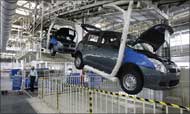Tata Motors, India's largest auto maker, today confirmed that it had decided to abort the multi-crore, government-backed car development project in Thailand without highlighting any specific reason.
 The company, along with some leading automobile companies like Honda Motor Company, Nissan Motor Company, Suzuki Motor Corporation, Mitsubishi Motor Corporation and Toyota Motor Corporation, had confirmed its participation in a series of projects connected with the Eco car in 2008.
The company, along with some leading automobile companies like Honda Motor Company, Nissan Motor Company, Suzuki Motor Corporation, Mitsubishi Motor Corporation and Toyota Motor Corporation, had confirmed its participation in a series of projects connected with the Eco car in 2008.
The Eco car project entails development of energy-efficient vehicles at economical prices.
The project is aimed at attracting industrial development to the region, while adding employment, and has strong backing of the local government. The cars developed under the scheme carry the advantage of a low-cost production process, which effectively translates into an average 20 per cent reduction compared with other models.
In a emailed reply to a questionnaire, a Tata Motors spokesperson stated: "Tata Motors (Thailand) confirms it will not participate in the Eco car project. However, the company will explore opportunities to expand its product portfolio by introducing a relevant passenger car model, from its portfolio, with appropriate investments for local production in Thailand. The product will be highly fuel-efficient and environmentally friendly, and will meet the aspirations of the Thai consumer."
Although the company refused to provide further explanation for the move, a report that appeared in the Bangkok Post on Wednesday cited the unfavourable excise structure and the requirement of large investments as the reasons behind Tata Motors' decision.
The government offered a 17 per cent excise tax slab on Eco cars to attract development, but later cut the excise tax on the comparable E85-powered vehicles to 22 per cent from 25 per cent. E85 engines run on ethanol-85 fuel. In addition, the excise tax on hybrid vehicles is 10 per cent.
In addition, both E85-powered and hybrid vehicles require less investment than Eco cars and have no production volume requirement, while Eco car producers are required to manufacture at least 100,000 units annually within five years of starting operations.
An investment to the tune to Rs 800-900 crore (Rs 8-9 billion) and a development period of around three-four years was pegged for the completely new car.
Also, Tata Motors failed to meet the Board of Investment's March 31 deadline to submit its Eco car project details. This led to the termination of the investment promotion certificate awarded to Tata Motors 18 months ago, according to the media report.
The company's car was supposed to debut in 2012 and it would have eventually been launched in India at a later stage.
Nissan, Japan's third-largest car producer, was the first company to have developed the Eco car when it successfully launched the 'March' compact car last month. This car will be launched by the company in India next month.
BoI offers the listed companies corporate tax exemptions for at least five years, provided their production reaches the required levels. It also said last year that manufacturers would enjoy cuts of up to 90 per cent in import tariffs on foreign car parts and material used for producing the vehicles, provided those parts were not manufactured by local vendors.
The report also stated that Tata Motors has offered to launch the Nano in the Thai market as a replacement. The world's cheapest car received a lot of attention when it was first showcased at the Thailand International Motor Expo in Bangkok last December.
The company has even offered test drives of the car as a part of its promotional activity at shopping malls in multiple provinces. The Tata Motors spokesperson did not offer any comments on the matter.
Tata Motors is already present in the Thai passenger car market with its Xenon pick-up range. It builds the vehicle range along with partners Thonburi Automotive.











 © 2025
© 2025